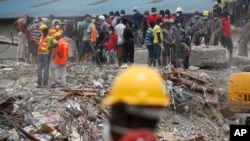Living spaces and office buildings continue to sprout all over Nigeria to meet the needs of a growing population, but many of these structures are built with little to no oversight and of substandard materials, leading to collapses that experts say could be avoided
Nearly a year to the day after a large dormitory under construction collapsed in a Lagos suburb, another building collapse claimed lives in Nigeria.
This time it was an Islamic school in the village of Bukuru in north-central Plateau state. Six people were killed, five of them children. It was raining and the roof of the two-story school fell on students studying inside.
A local leader, Bala Muhammad, told VOA that though villagers were aware that the building was structurally unsound, there was no other school in the area.
Experts say substandard materials and shoddy oversight have led to numerous building collapses in Africa’s most-populous country. Last year’s dormitory collapse at the church of mega-pastor T.B. Joshua was among the deadliest, claiming 116 lives.
Habu Mamman, an engineer in the city of Bauchi about 200 kilometers from Bukuru, says some building contractors use poor techniques or materials, like improper cement grades, and pay off inspectors.
“The oversight, that is supervision, is very, very poor. And they are in most cases, compromised,” Mamman says.
Some progress
Authorities elsewhere in Nigeria have managed to make progress against faulty buildings.
Ibrahim Farinloye is the southwest regional coordinator for the National Emergency Management Agency. His jurisdiction includes Africa's largest city, Lagos.
He says in 2012 and 2013, there were about 52 building collapses in the southwest. But that number has decreased since his agency began urging residents to report substandard buildings.
“We, at a time, within six months, we got an alert of about 500 information about different type of building under distressed situation,” Farinloye says.
Still, buildings keep coming down. Since the dormitory collapse last September, Farinloye says five buildings in his area have partially collapsed.
Ardo Hazzad contributed to this report from Bauchi, Nigeria.




